The Samsung SSD 850 EVO mSATA/M.2 Review
by Kristian Vättö on March 31, 2015 10:00 AM ESTRandom Read Performance
One of the major changes in our 2015 test suite is the synthetic Iometer tests we run. In the past we used to test just one or two queue depths, but real world workloads always contain a mix of different queue depths as shown by our Storage Bench traces. To get the full scope in performance, I'm now testing various queue depths starting from one and going all the way to up to 32. I'm not testing every single queue depth, but merely how the throughput scales with the queue depth. I'm using exponential scaling, meaning that the tested queue depths increase in powers of two (i.e. 1, 2, 4, 8...).
Read tests are conducted on a full drive because that is the only way to ensure that the results are valid (testing with an empty drive can substantially inflate the results and in reality the data you are reading is always valid rather than full of zeros). Each queue depth is tested for three minutes and there is no idle time between the tests.
I'm also reporting two metrics now. For the bar graph, I've taken the average of QD1, QD2 and QD4 data rates, which are the most relevant queue depths for client workloads. This allows for easy and quick comparison between drives. In addition to the bar graph, I'm including a line graph, which shows the performance scaling across all queue depths. To keep the line graphs readable, each drive has its own graph, which can be selected from the drop-down menu.
I'm also plotting power for SATA drives and will be doing the same for PCIe drives as soon as I have the system set up properly. Our datalogging multimeter logs power consumption every second, so I report the average for every queue depth to see how the power scales with the queue depth and performance.
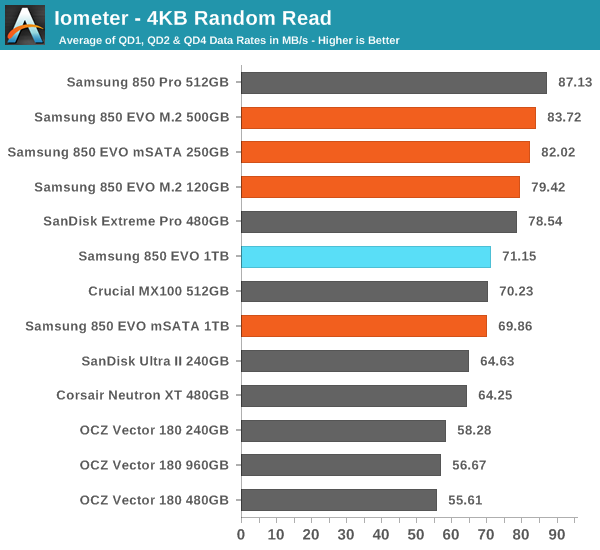
Random read performance has always been Samsung's strength and particularly the 500GB and smaller capacities do well thanks to the faster MGX controller.
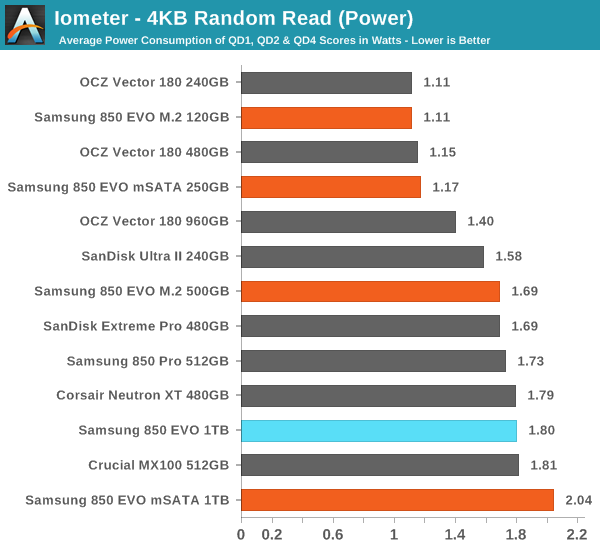
Power consumption is also good, although the 1TB model sips quite a bit of power.
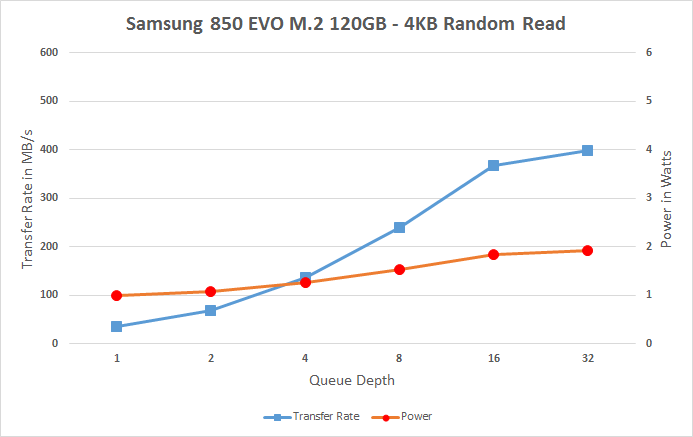 |
|||||||||
The performance scales nicely with the queue depth too.
Random Write Performance
Write performance is tested in the same way as read performance, except that the drive is in a secure erased state and the LBA span is limited to 16GB. We already test performance consistency separately, so a secure erased drive and limited LBA span ensures that the results here represent peak performance rather than sustained performance.
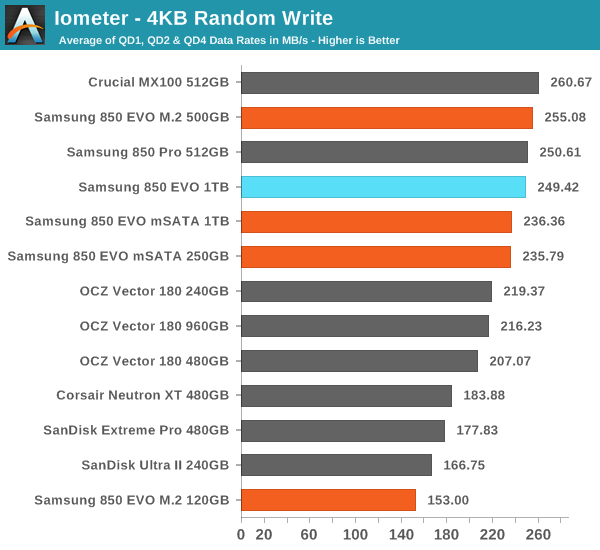
Random write performance is equally strong, which is mostly thanks to TurboWrite.
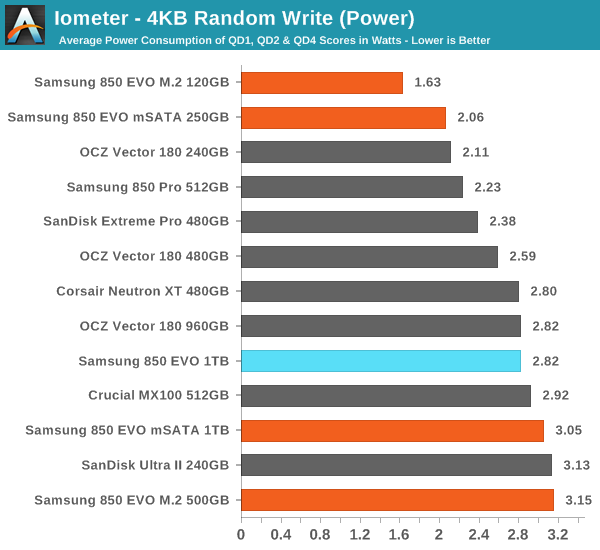
Power consumption is decent as well, and while the larger capacities are more power hungry the difference to competing drives isn't substantial.
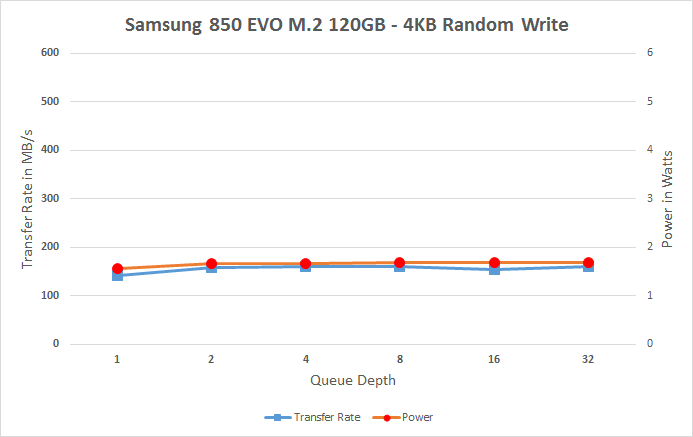 |
|||||||||
Since the 120GB SKU has less parallelism due to having less NAND, its performance doesn't scale at all with the queue depth (QD1 is already saturating the available NAND bandwidth), but the other models scale pretty nicely. You do see a slight drop in performance after the TurboWrite buffer has been filled, but in client workloads it's unlikely that you will be filling the buffer at once like our tests do.










58 Comments
View All Comments
cleverdude - Saturday, April 18, 2015 - link
Bench results have not been updated.http://www.anandtech.com/bench/SSD/65
szhosain - Monday, May 4, 2015 - link
On my Lenovo W530 laptop (about 3 years old now), I just installed a Samsung 850 EVO MSATA 1TB card, and ATTO shows me poorer numbers than seen here. About 267 MB/sec for write and 280 MB/sec for read when it peaks. My 2.5" SSD drives (from OCZ) in the same system are well over 500 MB /sec.Does this perhaps mean that the MSATA interface on this laptop is limited to 3 GB/sec rather than the 6 GB /sec on the standard SATA interfaces?
That would be quite irritating!
Ethos Evoss - Sunday, June 21, 2015 - link
When it comes to mSATA or M.2 connected to SATA III there is no point purchase stupid expensive SSDs as they will perform same as cheapest ones ..So best mSATA/m.2 SSD for SATA III use is the plextor or mushkin (i preffer plextor) which cost less and has great performance
Andrew Field - Wednesday, August 5, 2015 - link
This Samsung SSD 850 EVO mSATA constantly overheats. This is especially the case when copying large files. It rises about 10C every 30-60 seconds, and does not stop until its own overheating protection kicks in. This occurs when it is in a laptop or in an external enclosure (even when open and exposed to the air).Initially I thought I had a bad piece of hardware, but I tested 5 separate units with consistent results.
If anyone decides to test this out, I did the following:
- Step 1: Select a folder with at least 100GB of data
- Step 2: Copy said folder to a new folder (on the same Samsung SSD 850 EVO mSATA)
- Step 3: Monitored the temperature
Result: The temperature begins rising sharply in a few seconds, and does not stop rising until the SSD engages its overheating protection.
greywarden - Thursday, September 17, 2015 - link
I was about to purchase (4) 250GB 850 EVO mSATA drives to put in an Addonics quad mSATA PCIe card, but seeing the latency numbers on the drive has me concerned. Should I look into purchasing a pair of the 500GB models instead? Have the pausing and crashing problems been solved with the 1TB model yet?payamfi - Tuesday, January 19, 2016 - link
Hi guys i wanna buy a memmory for my n551jx i can not decide what to buy msata evo mini or ssd evo pro can anyone help me out?fabbrimichele75 - Friday, March 25, 2016 - link
Would it be possible to know the temperature when the disk is in idle and full load?I'm mainly interested in the M.2 version.
I'm asking because I wanted to mount it on an NUC 6i5 that seems to be sensitive to high temperature.
yolomolo - Tuesday, April 19, 2016 - link
Can i get some advice from you PRO, should i better go get mSata : Samsung EVO 850 or CRUCIAL MX200 ?